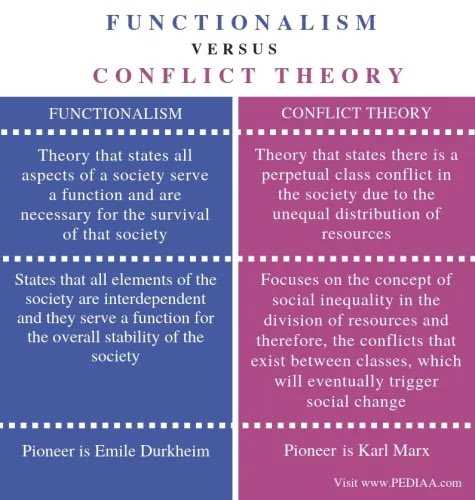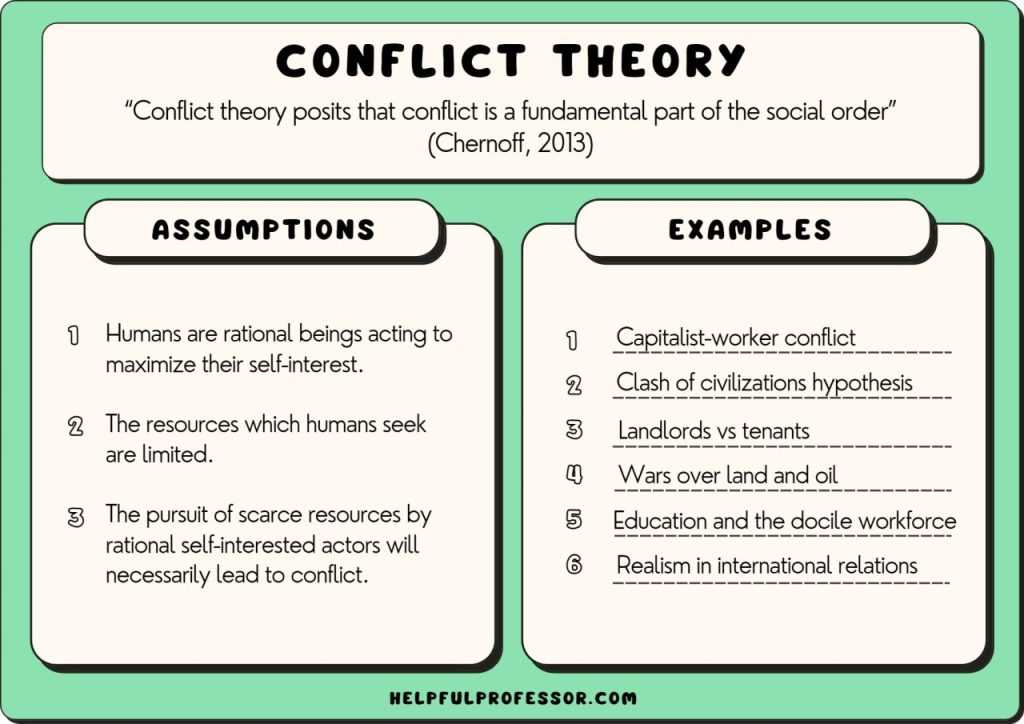Conflict Theory: Definition and Origins
Conflict theory is a sociological perspective that focuses on the role of conflict in society. It posits that society is characterized by inherent inequalities and power struggles between different social groups. According to conflict theory, these conflicts arise due to the unequal distribution of resources, such as wealth, power, and prestige.
The origins of conflict theory can be traced back to the works of Karl Marx, a 19th-century philosopher and sociologist. Marx believed that society is divided into two main classes: the bourgeoisie, who own the means of production, and the proletariat, who sell their labor to the bourgeoisie. He argued that the bourgeoisie exploit the proletariat to maximize their own profits, leading to class conflict.
Marx’s ideas laid the foundation for conflict theory, which has since been developed and expanded upon by other sociologists. One notable figure in the development of conflict theory is Max Weber, who emphasized the role of power and authority in social relationships. Weber argued that power can be based on various factors, such as wealth, status, and knowledge.
Conflict theory has been influential in various fields, including sociology, political science, and economics. In behavioral economics, conflict theory is often used to analyze how conflicts of interest between individuals or groups can affect economic behavior and outcomes. For example, it can help explain why workers may go on strike to demand better wages and working conditions, or why companies may engage in unethical practices to maximize their profits.
What is Conflict Theory?
Conflict theory is a sociological perspective that views society as a system characterized by social inequality and conflict between different groups. According to this theory, society is not harmonious and stable, but rather a battleground where various groups compete for power, resources, and social status.
According to conflict theory, social change occurs through conflict and struggle between different groups. This can manifest in various forms, such as class struggle, racial or ethnic conflicts, or gender inequality. Conflict theorists argue that social change is driven by the efforts of marginalized groups to challenge and overthrow the dominant group’s power and achieve a more equitable society.
In the context of behavioral economics, conflict theory can be applied to understand how economic decisions and behaviors are influenced by power dynamics and social inequalities. For example, conflict theory can explain why certain groups are more likely to engage in risky financial behaviors or why income inequality persists despite economic growth.
Founder of Conflict Theory

Conflict theory, a major perspective in sociology, was developed by Karl Marx in the mid-19th century. Marx, a German philosopher, economist, and sociologist, is considered the founder of conflict theory. His ideas and writings laid the foundation for this influential sociological perspective.
Marx believed that society is characterized by constant conflict between different social classes. He argued that the bourgeoisie, or the capitalist class who own the means of production, exploit the proletariat, or the working class who sell their labor. According to Marx, this exploitation leads to social inequality and conflict.
In his famous work, “The Communist Manifesto,” Marx outlined his theory of class struggle and the need for a proletarian revolution to overthrow the bourgeoisie and establish a classless society. He believed that this revolution would lead to the redistribution of wealth and power, creating a more equitable society.
Key Points:

Here are some key points about the founder of conflict theory, Karl Marx:
- Karl Marx developed conflict theory in the mid-19th century.
- He believed that society is characterized by constant conflict between different social classes.
- Marx argued that the bourgeoisie exploit the proletariat, leading to social inequality and conflict.
- His ideas laid the foundation for conflict theory and continue to be influential in sociology.
- Marx’s work emphasized the need for social change and the establishment of a classless society.
Examples of Conflict Theory in Behavioral Economics

Conflict theory, a key concept in behavioral economics, examines how conflicts and power dynamics influence economic behavior and decision-making. This theory suggests that individuals and groups within society are in constant conflict over limited resources, and this conflict shapes their economic choices and actions.
One example of conflict theory in behavioral economics is the study of bargaining and negotiation. In a bargaining situation, individuals or groups with conflicting interests engage in a strategic interaction to reach an agreement. Conflict theory helps explain the dynamics of this negotiation process, as each party tries to maximize their own gains while minimizing losses.
Another example is the analysis of competition and cooperation in economic markets. Conflict theory suggests that competition among firms or individuals for limited resources can lead to aggressive and self-interested behavior. This can result in unethical practices, such as price-fixing or collusion, as firms try to gain an advantage over their competitors.
Conflict theory also sheds light on the role of power dynamics in economic decision-making. In many situations, individuals or groups with more power and resources can exert influence over others and shape their economic choices. This can lead to inequalities in wealth and opportunities, as those with less power may be disadvantaged in economic transactions.
Furthermore, conflict theory can be applied to the study of social and economic inequality. It suggests that economic disparities are not solely the result of individual choices or abilities, but also the outcome of power struggles and conflicts within society. This perspective highlights the importance of addressing structural inequalities and promoting social justice in economic systems.
| Examples of Conflict Theory in Behavioral Economics: |
|---|
| 1. Bargaining and negotiation in economic transactions |
| 2. Competition and cooperation in economic markets |
| 3. Power dynamics in economic decision-making |
| 4. Social and economic inequality |

Emily Bibb simplifies finance through bestselling books and articles, bridging complex concepts for everyday understanding. Engaging audiences via social media, she shares insights for financial success. Active in seminars and philanthropy, Bibb aims to create a more financially informed society, driven by her passion for empowering others.
